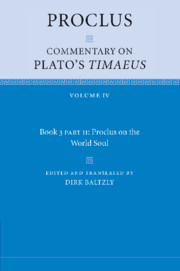III - The Soul’s Essence
Published online by Cambridge University Press: 30 June 2022
Summary
The soul's divisible and indivisible Being
Between the divisible Being that is always the same and the divisible Being that comes to be in the case of bodies he compounded a thirdspecies (eidos) of Being from both. (35a1–4)
Lexis for Tim. 35a1–4
By the indivisible Being he means that which is intellectual and participates in eternity with respect to the entirety of itself. But by divisible he means that which is in the realm of bodies, inseparable from extension, and which has been allotted an existence (hyparxis) that is entirely temporal. He has made this clear by calling the first that which is always the same, while he calls the second that which comes to be. He has done this in order that the soul should not only be simultaneously indivisible and divisible, but also in order that it may be called intelligible and the first among the things that have come to be. For eternal everlastingness (aiônios ädiotês) is one thing, while an eternity that has its existence (hypostasis) in being co-extensive with an unlimited time is another. The sort [of eternity] that is mixed from both is yet another thing, which is surely what there is in the case of soul. For soul is unchanging with respect to its essence, but it is changed with respect to its intellection (noeŝis). It is eternal with respect to the former, but temporal with respect to the latter. And it is clear that something of this sort necessarily pertains to the soul's existence (hyparxis), else it would not naturally manifest in its activities the defining characteristic of genesis and temporal extension. It seems to me that in a manner quite amazing Plato spotted this fact and indicated so by saying not only that the Demiurge made the soul to be a intermediate between the indivisible Being and that which is in relation to bodies, but by also saying that it is an intermediate between that which is always the same and that which comes to be. For how would it otherwise be fitting to write a generation of the soul (psychogonia) if there were in no way a genesis or composition in the soul?
- Type
- Chapter
- Information
- Proclus: Commentary on Plato's Timaeus , pp. 111 - 135Publisher: Cambridge University PressPrint publication year: 2009

